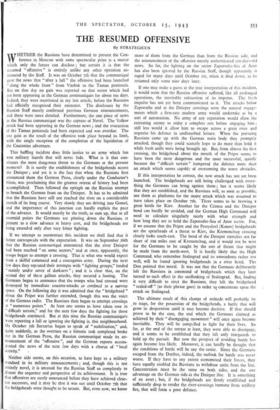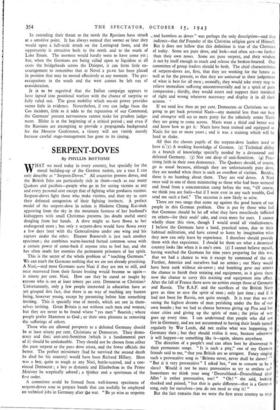THE RESUMED OFFENSIVE
By STRATEGIC US
WHETHER the Russians have determined to present the Con- ference in Moscow with some spectacular prize is a matter which only the future can disclose ; but certain it is that the resumed " offensive " is entirely unlike any other operation an- nounced by the Staff. It was on October 7th that the communiqué gave the news that " after a lull " the offensive had been launched along the whole front" from Vitebsk to the Taman peninsula. But on that day no gain was reported on that sector which had not been appearing in the German communiqués for about ten days. Indeed, they were mentioned in my last article, before the Russians had officially recognised their existence. The disclosure by the Russian Staff merely confirmed previous German announcements, and these were more detailed. Furthermore,' the one piece of news in the Russian communiqué was the capture of Nevel. The Volkov attack had been appearing in the German news ; and the evacuation of the Taman peninsula had been expected and was overdue. The one gain as the result of the offensive took place beyond its limit, with the single exception of the completion of the liquidation of the Caucasian adventure.
This baffling incident does little justice to an army which has won military laurels that will never fade. What is it that con- stitutes the most dangerous threat to the Germans at the present moment? It is surely the establishment of the bridgeheads across the Dnieper ; and yet it is the fact that when the Russians first announced them the German Press, clearly under the Conductor's baton, was proclaiming that the greatest retreat of history had been accomplished. Then followed the epitaph on the Russian attempt to breach the German front on the Dnieper. It has to be admitted that the Russians have still not reached the river on a considerable stretch of its long course. Very slowly they are driving into Gomel, and the importance of this junction can hardly explain the pace of the advance. It would merely be the truth, to sum up, that at all essential points the Germans are pinning down the Russians at present to a slow advance at heavy cost, and the bridgeheads are being extended only after very bitter fighting.
If we attempt to reconstruct this incident we shall find that it better corresponds with the expectation. It was on September 26th that the Russian communiqué announced that the river Dnieper had been reached " on some sectors," and at once, apparently, the troops began to attempt a crossing. That is what one would expect from a skilful' command and a courageous army. During the next few days they repeated their attempts with " fighting groups," landed " mainly under cover of darkness " ; and it is clear that, on the second day of these gallant attacks, they secured a footing. The Germans began to announce that the troops who had crossed were destroyed by immediate counter-attacks or confined to a narrow space. On the following day it was admitted that the " bridgehead " about the Pripet was further extended, though this was the voice of the German radio. The Russians then began to attempt crossings at " numerous points." At least one seems to have taken root in " difficult terrain," and for the next few days the fighting for these bridgeheads continued. But at this time the Russian communiqués were reporting a lull or ignoring the fighting in this neighbourhood. On October 5th Sertorius began to speak of " stabilisation," and, quite suddenly, as the overture on a historic task completed broke out in the German Press, the Russian communiqué made its an- nouncement of the "offensive ", and the German reports accom- Pitied the news of the next few days with a chorus of "local
activity." .
Neither side seems, on this occasion, to have kept to a military standard in its military announcements ; and, though this is not entirely novel, it is unusual for the Russian Staff so completely to distort the sequence and perspective of its achievement. It is true that offensives are rarely announced before they have achieved clear- cut successes, and it may be that it was not, until October 7th that the bridgeheads were thought to be secure. But, even now, we know more of them from the German than from the Russian side, and the announcement of the offensive merely authenticated ten-days-old news. So far, the fighting on the sector Zaporozhe-Sea of Azov has also been ignored by the Russian Staff, though apparently it raged for many days until October 1st, when it died down, to be resumed only some nine days later.
If one may make a guess at the true interpretation of this incident, it would seem that the Russian offensive suffered, like all prolonged operations, the inevitable exhaustion of its impetus. The fresh impulse has not yet been communicated to it. The attacks below Zaporozhe and at the Dnieper crossings were the natural engage- ments which a first-rate modern army would undertake as by a sort of automatism. No army of any reputation would allow . the retreating enemy to enjoy a complete rest before engaging him ; still less would it allow him to escape across a great river and organise his defence in undisturbed leisure. When the pursuing Russians came up with the German main body they promptly attacked, though they could scarcely hope to do more than hold it while fresh units were being brought up. But, from almost the first crossing, the bridgehead about the mouth of the Pripet seems to have been the most dangerous and the most successful, mainly because the "difficult terrain" hampered the defence more than an attack which seems capable of overcoming the worst obstacles.
If this interpretation be correct, the new attack has not yet been launched. The bridgeheads are still being challenged with every- thing the Germans can bring against them ; but it seems likely that they are established, and the Russians will, as soon as possible, use them as platforms for the major attack which was assumed to have taken place on October 7th. There seems to be brewing a great battle for Kiev. Another for the Crimea and the Dnieper bend can hardly be avoided, and the German High Command will need to calculate singularly nicely with what strength and how long they are to hold the Zaporozhe-Sea of Azov sector. For, if we assume that the Pripet and the Pereyslavl (Kanev) bridgeheads are the spearheads of a threat to Kiev, the Kremenchug crossing clearly looks south-east. The bend of the Dnieper stretches not far . short of too miles east of Kremenchug, and it would not be wise for the. Germans to be caught by the sort of thrust that might be made from the north-west. It is hardly likely that the High Command, who remember Stalingrad and its antecedents rather too well, will be found ignoring bridgeheads in a river bend. The Don pointed that moral. It was not that the Germans deliberately left the Russians in command of bridgeheads which they later turned to such effect in the outflanking of Stalingrad. But, finding it very difficult to eject the Russians, they left the bridgehead " sealed-off " (as their phrase goes) in order to concentrate upon the attack on Stalingrad.
The ultimate result of this change of attitude will probably he to stage, for the possession of the bridgeheads, a battle that will grow in desperation until it may become decisive. If that should prove to be the case, the end which the Germans claimed as achieved by their " disengaging movement " will once again become inevitable. They will be compelled to fight for their lives. So far, at the end of the retreat at least, they were able to disengage, and it seems to be established that they left only rearguards to hold up the pursuit. But now the prospect of avoiding battle has again become less likely. Moreover, it can hardly be thought that the conditions of battle will be any the easier. Since the Germans escaped from the Donbas, indeed, the outlook for battle was never worse. If they have to any extent economised their forces, they have equally enabled the Russians to withdraw units from the line. Concentration must be the same on both sides, and the one advantage on the German side.is the Dnieper line. It is something of an asset ; but, if the bridgeheads are firmly established and sufficiently deep to render the river-crossings immune from artillery fire, that will form a poor defence.
In extending their threat to the north the Russians have struck at a sensitive point. It has always seemed that sooner or later they would open a full-scale attack on the Leningrad front, and the opportunity is attractive both to the north and to the south of Lake Ilmen. The moment would hardly seem to have come yet ; but, when the Germans are being called upon to liquidate at all costs the bridgeheads across the Dnieper, it can form little en- couragement to remember that at Nevel a pawn has been placed in position that may be moved effectively at any moment. The pre- occupations in the south and the west cannot be left out of consideration.
It is to be regretted that the Italian campaign appears to have lapsed into positional warfare with the chance of surprise so fully ruled out. The great mobility which sea-air power provides seems little in evidence. Nevertheless, if one can judge from the Cos incident, little as it adds to the reputation of our Command, the Germans' present nervousness cannot make for prudent judge- ment. Hitler is at the beginning of a critical period ; and even if the Russians are attempting to provide a propaganda background for the Moscow Conference, a victory will not vanish merely because careful stage-management has gone to its timing.



























 Previous page
Previous page